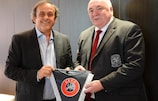Football's role in helping refugees
Thursday, June 20, 2013
Article summary
Thursday 20 June was World Refugee Day – and Michel Platini witnessed efforts to help Syrian refugees at a camp in Jordan, with football used to make young lives in particular more positive.
Article top media content

Article body
Football has the power to act as a massive social force and strives to make an enormous contribution to helping people, young and old, to overcome problems and face the future with greater optimism. The simple pleasure of kicking a ball and playing the game can bring unbridled joy, especially to young people who may be in disadvantaged situations.
20 June is World Refugee Day, an occasion dedicated to raising awareness of the situation of refugees throughout the world. It is a day when the public's attention is drawn to millions of refugees and displaced persons who may be without food or shelter as a result of war, among other things. In December 2000, the United Nations General Assembly adopted a resolution noting that 2001 would marked the 50th anniversary of the 1951 Convention relating to the Status of Refugees. The General Assembly decreed that 20 June would be celebrated as World Refugee Day.
UEFA's President, Michel Platini, was recently able to see for himself the activities being undertaken on behalf of refugees, more specifically as part of the Asian Football Development Project (AFDP), a body which is supporting Syrian refugees who have crossed the border into Jordan. Mr Platini visited the Zaatari refugee camp with fellow vice-president of the world football body FIFA and AFDP chairman HRH Prince Ali Bin Al-Hussein to gain first-hand knowledge of how the refugees and the Jordanian community are coping with the situation.
The UEFA President’s visit to the Zaatari camp follows the signing of a memorandum of understanding between UEFA and AFDP last December. Under the memorandum, UEFA has donated 15,000 footballs to be deployed in Asian development projects, and is also making technical expertise available. The agreement centres on initiatives which focus, among other things, on the well-being of youngsters, and inclusion and participation by all sectors of society in the game, especially women.
The Zaatari campsite, in northern Jordan, is currently the second-largest refugee camp in the world. According to the United Nations, it is equivalent to the fifth city in the country. More than 160,000 refugees have left their homes in Syria to flee the conflict, and a considerable majority of these are minors. Admirable efforts are being made to improve the quality of these young people's lives – both boys and girls – by using the power of football to stimulate them.
Mr Platini and Prince Ali toured the football facilities and watched a mine awareness workshop supported by the AFDP. The objective of such workshops is to raise such awareness of mine risks among children through football activities – thereby hopefully reducing the number of deaths and often serious injuries that mines can cause.
"I am proud to witness how UEFA's support to AFDP is helping youth in the refugee camp overcome this difficult phase in their lives," said Mr Platini. "Using football as a medium for social change continues to be our objective and we will work hard together to further strengthen our efforts." Mr Platini urged the organisation of as many football matches as possible in the camp.
"It is our responsibility," said Prince Ali, "to ensure that the kids believe in a better future – and what better way to inculcate a positive attitude among them than to use football's transcendent abilities that can help create a favourable environment for the boys and girls."

